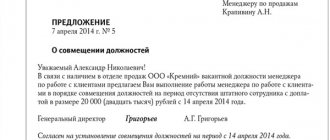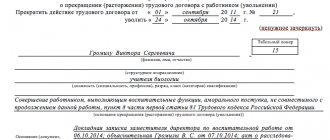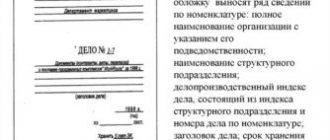The head of an LLC is the sole executive body that manages the current activities of the company. The position of a manager can be called differently, but its most common name is “general director” or simply “director”. The director acts on behalf of the organization without a power of attorney, but does not have complete freedom, because accountable to the founders of the company.
On the one hand, the director is an employer for the employees of his organization, on the other hand, he is an employee, on whose actions or inaction the economic success of the company that hired him largely depends. The specifics of labor relations with the manager are regulated by special Chapter 43 of the Labor Code.
Is it possible to fire a director? Who is authorized to do this? How to carry out the procedure for dismissing a director? Let's figure it out.
For what reasons can you be fired?
All grounds for dismissal are strictly regulated by the Labor Code of the Russian Federation and do not allow arbitrary expansion of their list. Each case of termination of an employment contract is carried out according to the rules established by law with the mandatory execution of a fixed package of documents.
there is no requirement in the law to explain to the employee why they were separated , the company is obliged to familiarize the dismissed employee with the relevant order, which clearly states the reason for ending the employment relationship.
You can stop collaborating with workers:
- on the initiative of the employee - Art. 80 Labor Code of the Russian Federation;
- at the initiative of the employer - Art. 81 Labor Code of the Russian Federation;
- by mutual agreement of the participants in labor relations - Art. 78 Labor Code of the Russian Federation;
- due to circumstances beyond the control of the parties - Art. 83 Labor Code of the Russian Federation.
Thus, dismissal without explanation and on grounds that are not specified in the Labor Code of the Russian Federation is illegal and threatens the company with significant material, economic, and reputational risks. However, the legislation has a special rule for managers, which actually provides for the possibility of parting with them without explaining the reason for such a decision.
How to correctly draw up an acceptance certificate when transferring documents
Taking into account the above standards, it is recommended to use the following version of the form as a kind of guide to action when developing your own template for the acceptance certificate.
I approve__________________________
(Chairman of the general meeting...)
(Signature) ________ /___________________/
Act of acceptance and transfer of cases upon change of director
G. ____________ "__"________
In connection with ________________________________ (indicate the reason, i.e. the dismissal of one person from the position of director and the appointment of another in his place, details of the minutes of the general meeting with the relevant decisions) _________________________________ this Act was drawn up stating that (indicate the full name of the dismissed director) ________________________________ passed, and (indicate the full name of the newly elected director) _____________________ accepted the following documents (list):
| No. | Document's name | Details (No., date) | Quantity | Note |
The listed documents and seal were handed over in proper condition. There are no complaints about the design. This Acceptance and Transfer Certificate is drawn up in 2 copies, one of which is transferred to (specify) _____________________________________________________, and the second (specify)__________________________________________________________________. Present during its compilation were:
commission consisting of (list everyone):________________________________________________ _________________________________________________________________________________
dismissed (full name) ___________________________________________________________________
newly elected (full name) ________________________________________________________________
Signatures of the parties:
Passed: _______ /______________/ Accepted: ________ /_____________/
Persons present:
__________________________
__________________________
The proposed version of the form contains a generalized minimum of information that is usually included in the transfer and acceptance certificate. They can be supplemented, rebuilt, modified. There are no restrictions on the layout of such documents as such.
How can you fire a director without giving a reason?
Although for most employees the answer to the question of whether they can be fired without cause is negative, for CEOs of companies it is not so obvious. For them, in paragraph 2 of Art. 278 of the Labor Code of the Russian Federation provides for a specific basis for termination of labor relations - related to the decision of the authorized body of the legal entity or the owner of the enterprise. Moreover, this provision does not require specification of the motives for the actions of the founders (see Resolution of the Plenum of the Supreme Court of the Russian Federation dated June 2, 2015 No. 21).
In practice, the reasons may be:
- dissatisfaction of business owners with financial results and quality of management;
- desire to modernize;
- loss of personal trust in the leader.
At the same time, due to the diversity of such circumstances and motives, they cannot be clearly formulated in the norms of the Labor Code of the Russian Federation.
Since the owner of an enterprise as a property complex has the right to own and manage it at his own discretion, he is endowed with the help of this article with the opportunity to change the director. A similar decision can be made:
- meeting of shareholders;
- general meeting of company participants;
- sole owner of the company.
IMPORTANT!
This basis relates to dismissal at the initiative of the administration and cannot be applied to persons named in Part 4 of Art. 261 of the Labor Code of the Russian Federation, pregnant women, as well as during vacation or sick leave.
Who signs the dismissal order?
Sometimes a situation may arise when a manager does not have the opportunity to sign an order to terminate his or her employment relationship. In such cases, it is possible to make sure that such a right is given to another person.
The following situations are possible:
- The issue of dismissing the director has already been decided, and he, having written a corresponding statement, goes on vacation, hoping not to return to the company after that. In this case, he can delegate his duties to his deputy during his absence. He will receive, in particular, the right to formalize the dismissal of the general director.
- You can issue an order on the right to sign on personnel documents for any trusted employee.
- You can issue a job description for one of the employees and provide for the right to sign in certain cases.
If desired, the director can at any time revoke the powers granted to another person if his plans change.
The procedure for dismissing a manager without explanation
The main difference between termination of an employment contract under clause 2 of Art. 278 of the Labor Code of the Russian Federation from other grounds for dismissal is concluded in the need to make a written decision of the owners or a body authorized by them.
The date of dismissal is the date the decision was made or another day indicated in it as the last working day. There are no other features associated with issuing an order and making records of dismissal in personnel documents .
IMPORTANT!
If dismissal without explanation on the basis described is not related to the guilty actions of the manager, then in addition to accrued wages, he is also entitled to severance pay in the amount of at least 3 average monthly earnings (Article 279 of the Labor Code of the Russian Federation).
Transfer of cases upon dismissal of a director
The manager is responsible for the safety of property and documents related to the activities of the organization. Upon dismissal, the director must hand over the files, which in practice means transferring, according to the act, to the new manager or acting director:
- constituent and registration documents of LLC;
- minutes of general meetings and decisions of participants;
- accounting and banking documents;
- documents confirming the organization’s ownership of real estate, transport and other property;
- personnel documents;
- licenses, approvals and permits issued to the company;
- agreements with counterparties and other important documents;
- seal and stamps of the organization, keys to the safe.
Although there is no established procedure for the transfer of cases, the manager bears full financial responsibility in accordance with Article 277 of the Labor Code of the Russian Federation. Based on this, before dismissal it is also worth conducting an inventory of the organization’s property.
Such a transfer of affairs is in the interests of the former director himself, because He may be held liable for damage caused to the organization even after his dismissal. If the director refuses to transfer affairs under the act, then the owner of the organization must create a commission that conducts an inventory of affairs and property and confirms the fact that the director refused to sign. Further, if the director’s actions actually caused damage to the organization, issues of recovery of damages are resolved in court.
What to do if you were fired from your job without reason
As mentioned above, arbitrary termination of an employment contract is possible only in relation to management personnel - solely by decision of the business owners or their authorized body. For other employees, unjustified separation will be considered an unlawful act.
In a situation where there was a dismissal without reason and it is not clear what to do, many give up and do not declare their rights violated. Although the legislation provides enough tools to counteract arbitrariness. An employee can:
- contact the trade union (if there is one);
- write a complaint to the labor inspectorate (LIT) or the prosecutor's office;
- file a claim in court for reinstatement at work.
Contacting a trade union body is, as a rule, ineffective, since in practice it is most often focused on the interests of the employer. Therefore, victims complain to the labor inspectorate or the prosecutor's office.
Termination of powers of the LLC director
Victoria!
The Federal Law “On Limited Liability Companies” defines the exclusive competence of the general meeting of company participants, in particular this includes the formation of the executive bodies of the company and the early termination of their powers, as well as the adoption of a decision on the transfer of powers of the sole executive body of the company to a commercial organization or individual entrepreneur, approval such manager and the terms of the agreement with him. That is, even if this provision is not provided for in the Company’s Charter, the imperative rule enshrined in clause 4, part 2 of Art. 33 Federal Law “On Limited Liability Companies”.
As for joint stock companies, Article 48 of the Federal Law “On Joint Stock Companies” defines the competence of the general meeting of shareholders, in particular it relates to:
1) determination of the quantitative composition of the board of directors (supervisory board) of the company, election of its members and early termination of their powers;
2) formation of the executive body of the company, early termination of its powers, if the company’s charter does not include the resolution of these issues within the competence of the board of directors (supervisory board) of the company.
The legal status of the head of an organization differs significantly from the legal status of other employees of the organization: the head acts on behalf of the organization, and the safety of the organization’s property, financial results and, ultimately, its very existence depend on his actions. If his actions contradict the interests of the organization, or the management efficiency is insufficient, or the results of his work for some other reason do not meet the requirements set by the owner of the organization’s property or his authorized body, then the law in this case provides additional grounds for terminating the employment contract with him .
Grounds for early termination of an employment contract
Article 278 of the Labor Code of the Russian Federation establishes additional grounds for termination of the powers of the head of an organization (the definition of the concept of “head of an organization” within the meaning of Chapter 43 of the Labor Code of the Russian Federation is given in Article 273 of the Labor Code of the Russian Federation), one of which is the adoption by the authorized body of a legal entity, or the owner of the organization’s property, or a person (body) authorized by the owner to make a decision on termination of the employment contract (clause 2).
Such an authorized body in limited liability companies, as is known, is the general meeting of participants (subparagraph 4, paragraph 2, article 33 of the Federal Law of 02/08/98 No. 14-FZ (hereinafter referred to as the LLC Law)). When forming a board of directors (supervisory board), this issue may be included in the company’s charter within its competence (Clause 2, Article 32 of the LLC Law). According to sub. 8 clause 1 art. 48 of the Federal Law “On Joint Stock Companies” dated December 26, 1995 No. 208-FZ (hereinafter referred to as the Law on JSC), the formation of the executive body of the company and the early termination of its powers fall within the competence of the general meeting of shareholders, if the company’s charter does not fall within the competence of the resolution of these issues board of directors (supervisory board) of the company. The decision to terminate an employment contract on the specified basis in relation to the head of a unitary enterprise is made by the body authorized by the owner of the unitary enterprise in the manner established by the Government of the Russian Federation (clause 2 of Article 278 of the Labor Code of the Russian Federation) (for example, in relation to the heads of federal state unitary enterprises, such a decision is made after the preliminary approval of his certification commission (clause 2 of the Decree of the Government of the Russian Federation of March 16, 2000 No. 234 “On the procedure for concluding employment contracts and certification of managers of federal state unitary enterprises”)).
As the Constitutional Court of the Russian Federation indicated in its Resolution No. 3-P dated March 15, 2005 (clause 4.1) (on checking the constitutionality of the provisions, in particular, clause 2 of Article 278 and Article 279 of the Labor Code of the Russian Federation), upon termination of the contract with the head of the organization, This basis does not require specifying certain circumstances confirming the need to terminate the employment contract, i.e., otherwise, the reasons for dismissal.
At the same time, according to clause 4.3 of the said Resolution of the Constitutional Court of the Russian Federation, the legislative enshrinement of the right to early terminate an employment contract with the head of an organization without indicating the reasons for dismissal does not mean that the owner has unlimited discretion when making such a decision and has the right to act arbitrarily, contrary to the purposes of providing the specified powers without taking into account the legitimate interests of the organization, and the head of the organization is deprived of guarantees of judicial protection against possible arbitrariness and discrimination. In addition, the Constitutional Court of the Russian Federation added the provisions of paragraph 2 of Art. 278, art. 279 of the Labor Code of the Russian Federation do not interfere with the head of the organization if he believes that the owner’s decision to early terminate the employment contract with him is actually due to circumstances that indicate discrimination, abuse of the right to challenge dismissal in court. When the court establishes the relevant facts based on an examination of all the circumstances of a particular case, his violated rights are subject to restoration.
This situation was not accepted unambiguously by all scientists, and, as correctly, according to the author, B. R. Korabelnikov noted, it turns out that the reasons for dismissal may not be indicated, but at the same time they are still subject to judicial review.
Procedure for terminating an employment contract
Since the most common organizational and legal forms for commercial organizations at present are limited liability companies and joint stock companies, we will discuss them further.
Obviously, business companies are interested in ensuring that the separation between the manager is peaceful and that he does not try to challenge the dismissal in court. To do this, the company must follow a certain dismissal procedure, taking into account the rights and guarantees of protection granted to the manager by law.
The first step is the adoption of a decision by the authorized body of the business company (or the sole participant (shareholder)). Such a decision can only be made by the body within whose competence this issue falls (in most cases, the general meeting of participants (shareholders)). Moreover, the decision made must contain not only the issue of termination of the powers of the previous manager, but also a clause on the appointment of a new manager.
The Law on LLC and the Law on JSC do not prohibit holding a general meeting of participants (shareholders) without the participation of the sole executive body, therefore, it will not be able to invalidate the decision of the general meeting on this basis (Definition of the Supreme Court of the Russian Federation dated June 30, 2006 No. 35-B 06- 3).
After the decision is made by the authorized body, the new manager must issue an order to terminate the employment contract with the previous manager (although this is not necessary) with reference to the relevant provision of the Labor Code of the Russian Federation and the decision of the authorized body and make a corresponding entry in the work book. The former manager, indicating the date of notification, as well as the organization’s employees and security personnel must be familiarized with the decision and order of dismissal. Compliance with the notification procedure is necessary so that the new manager has additional legal grounds to demand that the previous manager hand over to him all the company’s documents, seals, office keys and safes.
If the dismissed manager refuses to carry out these actions voluntarily, it is also recommended to send a letter to his permanent registration address with a proposal to take the necessary actions, and if there is further inaction, to switch to forceful methods of resolving the conflict.
However, not all business owners are ready to take such steps and strive to transfer the conflict to a peaceful direction. The options here can be very different: for example, offer the former manager to conclude a new employment contract to fill a different position, but without vesting him with real powers (for example, an adviser to the general director).
The new manager can exercise his powers from the moment the decision is made by the authorized body, however, the change of the sole executive body is a change in the Unified State Register of Legal Entities, relating to information about the legal entity and not related to amendments to the constituent documents. A legal entity, within three days from the date of change of director, is obliged to notify the registration authority at its location about this: the applicant in this case can be either a dismissed director of the organization or a newly elected one. Failure to submit, or untimely submission, or submission of false information about a legal entity or an individual entrepreneur to the body carrying out state registration of legal entities and individual entrepreneurs, in cases where such submission is provided for by law, entails a warning or the imposition of an administrative fine on officials in the amount of 5,000 rub. (Part 3 of Article 14.25 of the Code of Administrative Offenses of the Russian Federation).
It is necessary to carry out state registration of changes in the Unified State Register of Legal Entities in a short time also because without an extract from the Unified State Register of Legal Entities, the new manager will not be able to issue a bank card at the servicing banks, which will lead to the inability to use a current account (before this point, it is recommended to send a copy of the minutes of the general meeting to the bank participants (shareholders) and an order to dismiss the former manager in order to exclude the possibility of his illegal use of funds in the organization’s current account).
Compensation for early termination of an employment contract and other guarantees to the manager
The right to early termination of an employment contract with the head of an organization does not mean that such termination should not comply with legal guarantees to protect the manager from the negative consequences of job loss. One of these guarantees is the right to compensation.
In case of termination of the employment contract with the head of the organization in accordance with clause 2 of Art. 278 of the Labor Code of the Russian Federation, in the absence of guilty actions (inaction) of the manager, he is paid compensation in the amount determined by the employment contract, but not less than three times the average monthly salary.
The only ground that exempts a business owner from paying compensation to a former manager upon early termination of an employment contract is the latter’s guilty actions (inaction). If the reason for early termination of the employment contract is other reasons, then such compensation must be paid.
The previous edition of this article did not contain an indication of the specific minimum amount of money to be paid to the head of the organization, and this article was declared unconstitutional by the already mentioned Resolution of the Constitutional Court of the Russian Federation of March 15, 2005 No. 3, after which Federal Law of June 30, 2006 No. 90-FZ introduced corresponding changes establishing the minimum amount of compensation.
The amount of compensation is determined by the employment contract; it may also disclose the procedure for terminating an employment contract with the head of an organization on the basis of clause 2 of Art. 278 of the Labor Code of the Russian Federation (for example, the period required for preliminary notification of termination of the contract, which must be sent to the dismissed manager).
Often, the procedure for dismissing the head of an organization is accompanied by disputes between the parties, including over the amount of compensation. In any case, the business owner should be prepared for the former manager to seek judicial protection of his rights if he believes that the business owner is abusing his rights.
As the Constitutional Court of the Russian Federation indicated in paragraph 4.2 of the said Resolution, termination of an employment contract with the head of an organization in this case is not a measure of legal liability and is not allowed without paying him fair compensation, the amount of which is determined by the employment contract (i.e. by agreement of the parties), and in case of a dispute - by a court decision.
In case of early termination of an employment contract, the head of the organization is provided with other guarantees of protection against arbitrariness and discrimination on the part of the business owner. As stated in paragraph 50 of the Resolution of the Plenum of the Armed Forces of the Russian Federation dated March 17, 2004 No. 2 “On the application by the courts of the Russian Federation of the Labor Code of the Russian Federation”, taking into account that Art. 3 of the Labor Code of the Russian Federation prohibits restricting someone’s labor rights and freedoms depending on their official position, and also taking into account that the dismissal of the head of an organization in connection with the adoption by an authorized body of a legal entity, or the owner of the organization’s property, or a person (body) authorized by the owner of a decision on early termination of an employment contract is essentially dismissal at the initiative of the employer and Chapter 43 of the Labor Code of the Russian Federation, which regulates the peculiarities of the work of the head of an organization, does not contain rules depriving these persons of the guarantee established by Part 6 of Art. 81 of the Labor Code of the Russian Federation, in the form of a general ban on the dismissal of an employee at the initiative of the employer during a period of temporary incapacity for work and while on vacation (except in the case of liquidation of an organization or termination of activities by an individual entrepreneur), an employment contract with the head of an organization cannot be terminated under clause 2 of Art. . 278 of the Labor Code of the Russian Federation during the period of his temporary incapacity for work or while on vacation.
If the employment contract is concluded for an indefinite period or is not concluded in writing
In most cases, a fixed-term employment contract is concluded with the heads of the organization (Part 1 of Article 275 of the Labor Code of the Russian Federation). However, in law enforcement practice there are situations when an employment contract with the head of an organization is not concluded in writing, or is concluded for an indefinite period, or when a fixed-term employment contract becomes indefinite in accordance with Part 4 of Art. 58 Labor Code of the Russian Federation.
As the Constitutional Court of the Russian Federation indicated in paragraph 6 of the above-mentioned Resolution, the type of employment contract in itself does not predetermine the nature and content of the work of the head of the organization; also do not depend on whether the employment contract is concluded for a definite or indefinite period, the features of the labor function performed by the manager, which determine the legislative enshrinement of the possibility of terminating the employment contract with him without specifying the reasons, and those factual circumstances due to which it may be necessary to relieve the manager from positions.
Currently, the provision of paragraph 2 of Art. 278 of the Labor Code of the Russian Federation is formulated in such a way that it applies to both open-ended contracts and contracts concluded for a certain period.
For contracts not concluded in writing, the general provisions of Part 2 of Art. 67 of the Labor Code of the Russian Federation on the form of an employment contract (an employment contract not formalized in writing is considered concluded if the employee began work with the knowledge or on behalf of the employer or his representative).
Thus, in case of early termination of an employment contract with the head of an organization, it is necessary, first of all, to strictly comply with the legal procedure and guarantees provided to the head by labor legislation. No one is immune from a conflict with a dismissed manager, but it makes sense to take effective measures to resolve the dispute out of court.
How to contact the State Tax Inspectorate and the prosecutor's office
The process for submitting an application to these institutions is similar:
1. Fill out an application in any form, in which they indicate:
- details of the institution and official to whom the complaint was sent;
- contact information of the applicant;
- information about the employer who committed the violations;
- a list of violations committed in the applicant’s opinion and a request to compel the employer to eliminate them.
2. After receiving the complaint, unscheduled inspection of the employer is scheduled.
3. If violations are confirmed, an order to cancel the dismissal order is issued.
4. The applicant must receive a written response based on the results of the verification of his complaint within 30 days from the date of application.
How to initiate a lawsuit
The employee is not obliged to contact the supervisory authorities before filing a claim in court. He can initiate legal proceedings either immediately after dismissal or after receiving the results of unscheduled inspections by the State Tax Inspectorate or the prosecutor's office.
The claim is filed in the district court at the discretion of the dismissed person :
- at his place of residence;
- according to the territory of the employer’s location;
- at the place of work.
IMPORTANT!
The statute of limitations for going to court is 1 month from the date of familiarization with the dismissal order (Article 392 of the Labor Code of the Russian Federation).
maximum evidence to the statement of claim . After the hearings, the court may decide to reinstate the illegally dismissed person, pay him lost earnings during forced absence, as well as compensation for moral damage (if he claimed it in the claim).
Read also
29.09.2018
In what order does the manager receive the payment?
On the last day of work with the dismissed general director, the final payment is made. On the same day, he receives a certificate of the amount of earnings and his work book with a record of dismissal.
If the dismissed employee did not work on the established day of dismissal (was on vacation or was sick), then the due money is paid the next day after he submits a request for final payment (Article 140 of the Labor Code of the Russian Federation).
In case of violation of the deadlines for the final settlement with the dismissed general director, his employer is obliged to pay compensation for the delay in due payments in the amount of at least 1/150 of the current key rate of the Central Bank of the Russian Federation (Article 236 of the Labor Code of the Russian Federation). Compensation is calculated for each day of delay, starting from the day following the day when the employer was supposed to make the final payment upon dismissal, up to and including the day of actual payment.
Thus, in the event of dismissal, the CEO is entitled to compensation in the form of a golden parachute or severance pay. However, when an employment contract with a dismissed director of an enterprise (company) is canceled due to his commission of various disciplinary offenses, such payments are not due.
In any case, the employer is obliged to make the final settlement with the director in a timely manner. If due payments are delayed, the dismissed person must be paid appropriate compensation.









